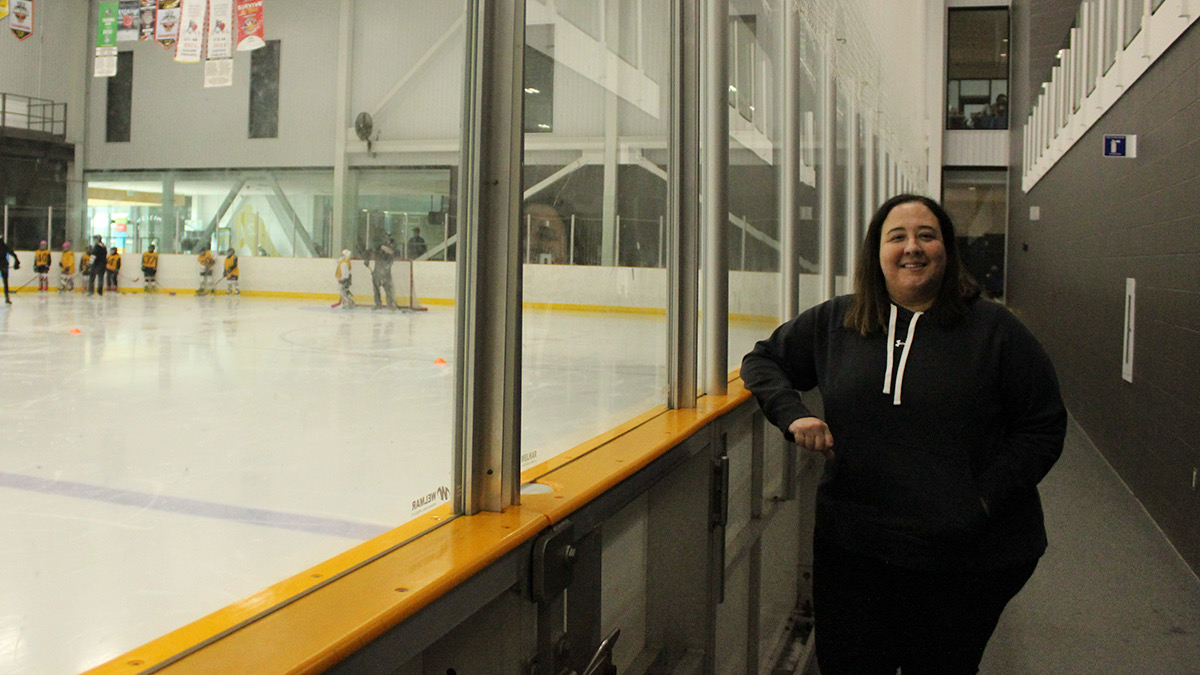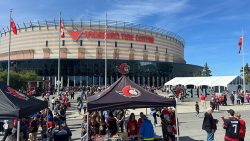As a new season on the ice starts, many local hockey and ringette associations fear the annual shortage of ice time at city facilities will get worse before it gets better.
Lack of sufficient ice time frustrates the organizers scheduling around the limited availability, as well as players, parents and coaches who face increased costs and less-than-convenient time slots.
“When there’s not enough usable ice to go around, there’s always someone who’s going to get the short end of the stick, and that creates frustrations,” said Martin Roussel, president of the Ottawa Girls Hockey Association.
At present, availabile unrented ice time at the 43 city-operated facilities is very low, with only 5.4 per cent of times still unused, according to statistics provided by the City of Ottawa.
A map of all city-run arenas (red pegs) and private arenas (green pegs) in Ottawa, with the percentage of unused ice times included within each peg.
Associations submit a request to the city each year asking for a certain number of ice hours. The city then considers the number registered and facility availability during prime hours in order to allocate ice.
As the ice scheduler for the City of Ottawa Ringette Association, Pablo Sobrino said he always asks for more hours than the city provides. This year, he asked for 40 hours per week and ended up with 32 to divide among the association’s 27 teams.
“I think we all get in the habit of asking for more so that we can manage with what they give us,” he said.
For Roussel, the shortage is particularly an issue during high-demand times — especially the short weeknight windows between 6 and 10 p.m. For younger players, he said, the window is even shorter.
“The girls are still young and they don’t necessarily want to finish at 11 p.m. and go to school the next day,” he said.
The ice-time issue is exacerbated by aging rinks temporarily out of commission for renovations. Sobrino and Roussel said they will be short several hours of ice time because of the closure of the Jim Durrell Arena, which is to reopen in November.
Central Ottawa associations are still adjusting to the loss of the RA Centre, as well as two privately run rinks at the Minto Skating Centre, within the last two years.
One of the rinks at the Nepean Sportsplex is also temporarily closed because of refrigeration problems. An organizer with the Nepean Girls Hockey Association — the biggest girls’ hockey association in Eastern Ontario, with nearly 50 teams — said it has been difficult adjusting with one of its main rinks out of service.
“For us, it’s more of a juggling act and making sure everything’s still fair,” said Lisa Camilucci, house league director for the Nepean Girls Hockey Association.
Dan Chenier, general manager of recreation, cultural and facility services at the City of Ottawa, said in a statement that five more arenas are to undergo complete ice-plant replacement in the next five to 10 years — temporarily taking them out of service.
In light of the shortages, many associations supplement by renting private ice time from the Sensplex, Carleton University and the University of Ottawa. But Sobrino added the association pays “close to double” to rent these facilities compared to the cost of renting from the city.
With increased demand and facility costs come increased registration costs for players. Sobrino added the ringette association has recently experienced a decrease in registration, partly because of how expensive it is to play.
“We’ve had to put up our rates because ice costs more, insurance costs more, referees cost more, all that stuff,” he said. “It’s becoming difficult to afford for a lot of families.”
Chenier wrote the city is still evaluating “the adequacy of the current number of rinks in Ottawa as staff continue to assess the post-pandemic level of demand for each sport,” adding 2024 will be the first base year for analysis.
He added the city plans to add two new ice pads in Riverside South within the next five years.
But until those rinks are built and the aging facilities are updated, local organizations fear the ice time shortage will worsen as demand increases and facilities are temporarily out of service.
Associations are looking at a future of limiting registration numbers if the shortage continues, which Sobrino said “will be very difficult to do.”
The Ottawa Girls Hockey Association was invited to form a senior team this year, but Roussel said it had to decline because it “did not have the ice to absorb another team.”
“Our capacity to grow is limited based on where we are right now,” he said.




